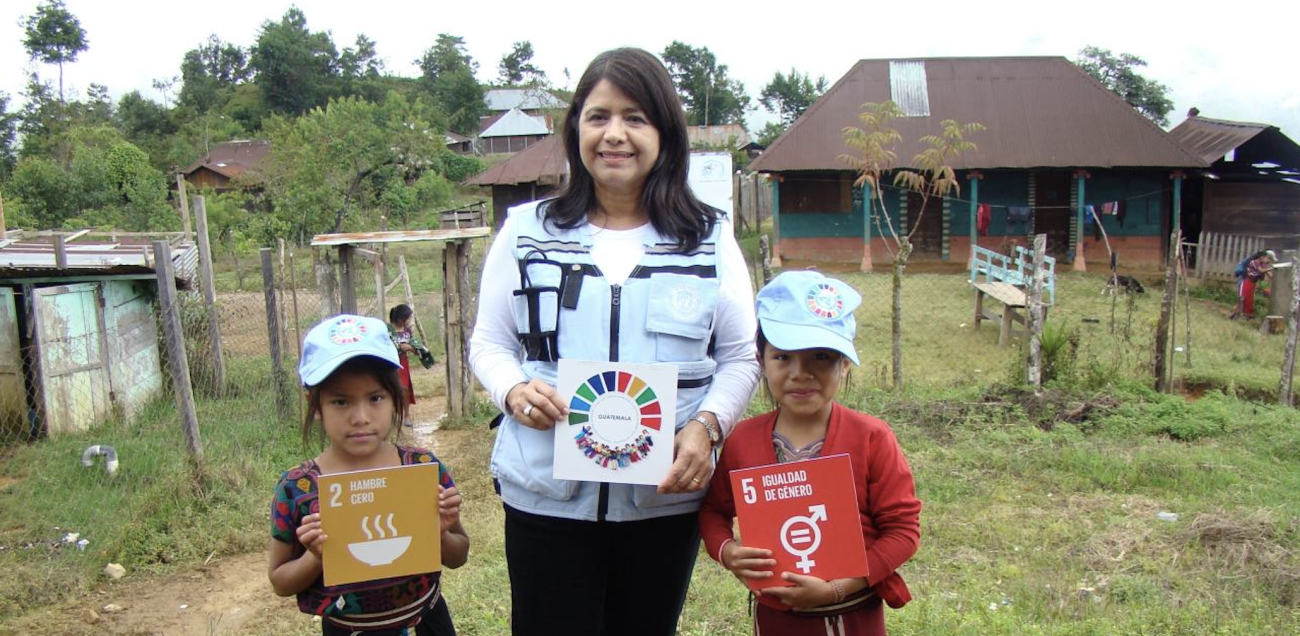The privilege of serving

Looking back on a challenging 2021, the UN Resident Coordinator in Guatemala pays tribute to his colleague and long-time former Resident Coordinator Rebeca Arias Flores, who passed away sadly on the 19th of May after recently retiring from a 30-year career in the UN system.
As well as penning this op-ed in tribute to Ms. Flores, Resident Coordinator Miguel Barreto also acknowledged his appreciation for her work in a foreword he wrote for the UN Guatemala Annual Results Report 2021, describing her as the “driving force” behind the UN’s COVID-19 recovery response in Guatemala last year.
Under Ms. Flores’ leadership, the UN Country Team in Guatemala implemented a broad range of programmes and initiatives to address the deep social, economic and environmental inequalities which were exacerbated by the pandemic. During this first recovery year since the pandemic, Ms. Flores dedicated herself and her team to protecting Guatemala’s hard-won developmental gains and ensuring that no one is left behind in the journey towards the 2030 Agenda.
The Resident Coordinator made a special mention about Ms. Flores’ work with indigenous communities in Guatemala and her tireless commitment to protecting their rights, amplifying their voice and learning from their wisdom.
The op-ed below was originally published on the 17th of June in Prensa Libre, a Guatemalan nationwide newspaper. It has been adapted for the UNSDG website by the UN Development Office.
The life of a public servant—including those of us working in the field as part of the international civil service, is an enriching endeavor and a huge privilege.
Last year, the United Nations system supported the Government of Guatemala and its people through over 200 projects and programmes designed to strengthen public policies in line with National Development Priorities and the 2020-2025 Bilateral Cooperation Framework.
The UN system has a strong presence here in Guatemala, with 24 resident and non-resident agencies, funds, programmes, and specialized organizations all working together to advance the Sustainable Development Goals and National Development Priorities. The UN Country Team (UNCT) coordinates these efforts, implementing programmes and projects across the broad field of economic and social development, peace, security and justice, strengthening of public institutions, and environmental protection.
None of the achievements the UN country team has made here in Guatemala over the five years would have been possible without the dedicated service of my dear colleague and predecessor, Rebeca Arias Flores, who sadly passed on the 19th of May. As I take over the role of Resident Coordinator, I look back at the substantial achievements the UN country team in Guatemala have made under the leadership of my late colleague Ms. Flores.
In the health field, the UN country team supported the planning and implementation of the COVID-19 National Vaccination Plan, and also helped Guatemala participate in the COVAX Mechanism; an UN-led alliance that aims to boost equitable access to COVID-19 diagnostics, treatments and vaccines around the world.
In education, the team helped design a remote education strategy ‘I learn at home’ and also supported programmes on school feeding, out-of-school education, educational reintegration and skills certification.
Food and nutrition have also been a key pillar of UNCT’s work here in Guatemala. Together with other partners the team helped update the national food and nutrition security policy and implemented ‘the Great National Crusade for Nutrition’ (Gran Cruzada Nacional por la Nutrición, GCNN, in Spanish).
In the field of social protection, the UN system has helped implement a gender-sensitive Social Register of Households and supported the development of the computer system for the Social Allowance programme.
Efforts have also been focused on the economic development of Guatemala, strengthening the capacities of micro, small, and medium-sized enterprises and small producers. In addition, the UNCT has supported the National Coalition for the Economic Empowerment of Women and helped create various women-led protection networks at the local level.
In the sphere of peace, security and justice, the team worked with partners on the ground to prevent violence against women, children and young people. To improve access to justice, we helped strengthen the service delivery models of the institutions serving this purpose.
The UN system’s work on environmental protection focused on modernizing the forestry information system, improving crop monitoring systems, introducing forestry incentives, and helping to prepare the Third National Communication on Climate Change.
Strengthening Guatemala’s public institutions was also a key priority for the UN country team, particularly in the field of migration and human mobility. This included providing support for Guatemalan migrants, people in transit, refugees and applicants for refugee status.
In the field of humanitarian assistance and disaster risk reduction, the UNCT worked together with the Humanitarian Country Team to support the implementation of the recovery plan. We also updated the Humanitarian Needs Overview and the Humanitarian Response Plan with a gender-specific focus.
As I step into this new role, I want to thank the UN Country Team for their dedicated efforts to advance the Sustainable Development Goals in Guatemala. I reiterate my appreciation and thanks to our dear colleague Rebeca Arias Flores, not only for her achievements in Guatemala but for her 30 years of dedicated service to the United Nations system. This publication, available at Guatemala.un.org, is part of our commitment to transparency, accountability and the privilege of serving the public good.













